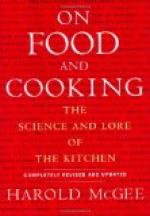Bread, to answer the requirements of a good, wholesome article of food, beside being palatable, must be light, porous, and friable, so that it can be easily insalivated and digested. It should not contain ingredients which will in any way be injurious if taken into the system, but should contain as many as possible of the elements of nutrition. Wheat, the substance from which bread is most generally made, contains all the necessary food elements in proper proportions to meet the requirements of nutrition, and bread should also contain them. The flour, however, must be made from the whole grain of the wheat, with the exception of the outer husk.
What is ordinarily termed fine flour has a large part of the most nutritive properties of the grain left out, and unless this deficiency is made up by other foods, the use of bread made from such material will leave the most vital tissues of the body poorly nourished, and tend to produce innumerable bad results. People who eat bread made from fine white flour naturally crave the food elements which have been eliminated from the wheat, and are thus led to an excessive consumption of meat, and the nerve-starvation and consequent irritability thus induced may also lead to the use of alcoholic drinks. We believe that one of the strongest barriers women could erect against the inroads of intemperance would be to supply the tables of the land with good bread made from flour of the entire wheat.
The superiority of bread made from the entire wheat or unbolted meal has been attested by many notable examples in history. In England, under the administration of William Pitt, there was for several years such a scarcity of wheat that to make it hold out longer, a law was passed by Parliament that the army should be supplied with bread made of unbolted flour. This occasioned much murmuring on the part of the soldiers, but nevertheless the health of the army improved so greatly as to be a subject of surprise. The officers and the physicians at last publicly declared that the soldiers had never before been so robust and healthy.
According to the eminent Prof. Liebig, whole-wheat bread contains 60 per cent more of the phosphate or bone forming material than does meat, and 200 per cent more gluten than white bread. To the lack of these elements in a food so generally used as white flour bread, is undoubtedly due the great prevalence of early decaying teeth, rickets, and other bone diseases. Indeed, so many are the evils attendant upon a continued use of fine flour bread that we can in a great measure agree with a writer of the last century who says, in a quaint essay still to be seen at the British Museum, that “fine flour, spirituous liquors, and strong ale-house beer are the foundations of almost all the poverty and all the evils that affect the labouring part of mankind.”




